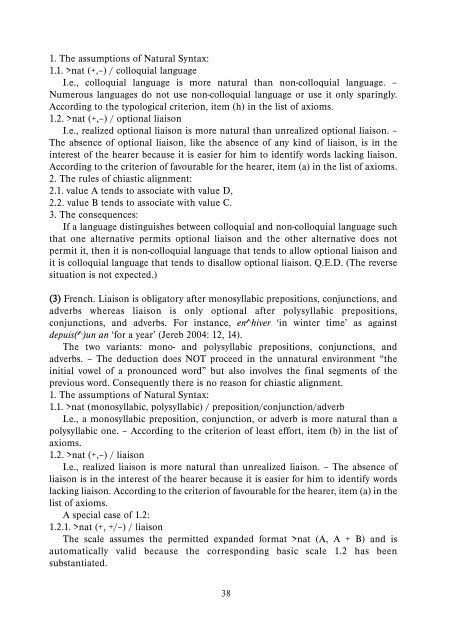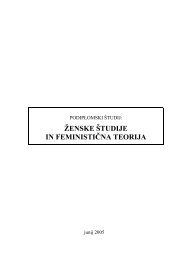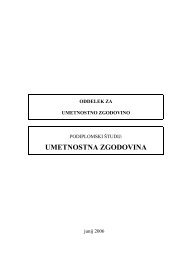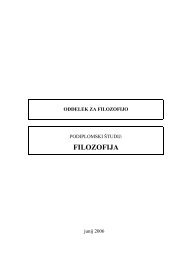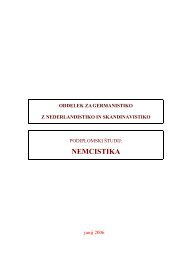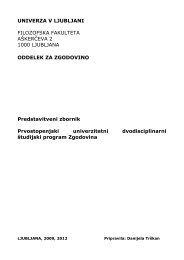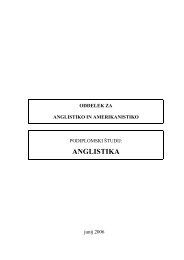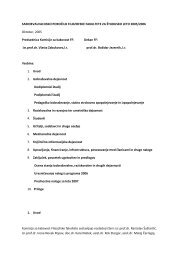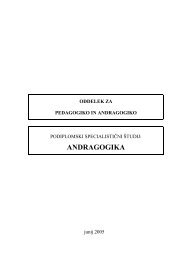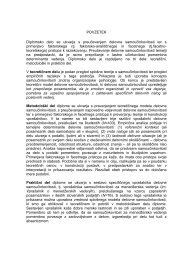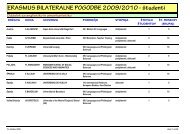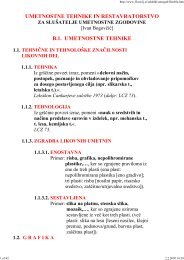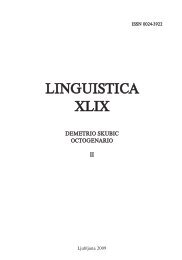- Page 1 and 2: LINGUISTICA XLVIII DEMETRIO SKUBIC
- Page 3 and 4: vSeBiNa - SOMMaiRe iL PROFeSSOR Mit
- Page 5: Silvana Orel kos a CONtRaStive-StyL
- Page 8 and 9: Nonostante gli impegni organizzativ
- Page 11 and 12: BiBLiOGRaFiJa PROF. MitJa SkUBiCa (
- Page 13 and 14: 1969 Članki/articles Pretérito si
- Page 15 and 16: 1974 Samostojne publikacije/livres
- Page 17 and 18: Recenzije, ocene, poročila/Comptes
- Page 19 and 20: elementi linguistici latini e roman
- Page 21 and 22: 1989 Samostojne publikacije/livres
- Page 23 and 24: 1992 Članki/articles Riflessi dell
- Page 25 and 26: Roberto Dapit, la slavia friulana.
- Page 27 and 28: Recenzije, ocene, poročila/Comptes
- Page 29 and 30: und Beträge zur croatischen kultur
- Page 31: krajši članki in prispevki/Contri
- Page 34 and 35: (b) the principle of least effort (
- Page 36 and 37: cannot be extended to the right; i.
- Page 40 and 41: (4b) French. Pronouns ending in a n
- Page 42 and 43: i.e., realized liaison is more natu
- Page 44 and 45: would result in correct predictions
- Page 46 and 47: 4.2. Generative phonology’s solut
- Page 48 and 49: Povzetek vezaNJe (LiaiSON) v kNJiŽ
- Page 50 and 51: à travers la prosodie de son disco
- Page 52 and 53: Le marqueur discursif ne est donné
- Page 54 and 55: point de vue prosodique. C’est le
- Page 56 and 57: Contours mélodiques (segments 2, 3
- Page 58 and 59: Bibliographie BeaUGRaNDe, Robert al
- Page 60 and 61: présentés sous leur forme authent
- Page 62 and 63: 3. aNaLySe D’UN Fait DiveRS DaNS
- Page 64 and 65: L’exemple 3 contient quatre parti
- Page 66 and 67: initiale et l’action (en mentionn
- Page 68 and 69: 10 de la mañana a la figura de Hit
- Page 70 and 71: L’hypothèse du départ est confi
- Page 72 and 73: Povzetek ČLaNek iz (ČRNe) kRONike
- Page 74 and 75: Force est d’ajouter que même ce
- Page 76 and 77: complique considérablement. Le nar
- Page 78 and 79: s’intensifie vers la fin, surtout
- Page 80 and 81: « Révolte... pas au Bas-Meudon !
- Page 82 and 83: Povzetek jaZ zNOtRaJ jaZa v ROMaNiH
- Page 84 and 85: CONveNtiON 1 Évolution du concept
- Page 86 and 87: dies et pièces de boulevard), obje
- Page 88 and 89:
settes anglaises. un long moment de
- Page 90 and 91:
teur n’est pas en position de voi
- Page 92 and 93:
du moins ne se formule pas comme te
- Page 94 and 95:
Povzetek DiDaSkaLiJa kOt BeSeDiLO S
- Page 96 and 97:
écit coïncide avec l’ordre chro
- Page 98 and 99:
3. Le CHOix DU LaNGaGe L’oeuvre r
- Page 100 and 101:
4. CONCLUSiON zazie est une adolesc
- Page 103 and 104:
tjaša Miklič UDk 811.131.1'366.58
- Page 105 and 106:
quotidiane (nel parlare captato cas
- Page 107 and 108:
un Presente (sei), nell’ultima (3
- Page 109 and 110:
e altre periferiche (anteriore, con
- Page 111 and 112:
dai visitatori. dopo una lunga conv
- Page 113 and 114:
(15) [...] alpi e mare non sono sta
- Page 115 and 116:
2.5 Discorso indiretto libero (DiL)
- Page 117 and 118:
(22) guardassi invece il giovane la
- Page 119 and 120:
FLeiSCHMaN, Suzanne (1990) tense an
- Page 121 and 122:
Darja Mertelj UDk 811.131.1'367:371
- Page 123 and 124:
2. Le forme e la complessità dell
- Page 125 and 126:
apprendenti, cf. esempi 24-27 (in s
- Page 127 and 128:
nella comunicazione con i parlanti
- Page 129 and 130:
Gli esempi sarebbero da includere n
- Page 131 and 132:
5. FRaSi iMPeRative NON PROtOtiPiCH
- Page 133 and 134:
45a) signora, saprebbe/potrebbe dir
- Page 135:
MeRteLJ, Darja (2007) «italian imp
- Page 138 and 139:
2. aNaLiSi 2.1. Presentazione del c
- Page 140 and 141:
anche la combinazione dei segnali s
- Page 142 and 143:
serve da «ponte» tra due enunciat
- Page 144 and 145:
vi espressione di ComparteCipaZione
- Page 146 and 147:
(eSeMPiO iLLUStRativO Di sì) (27)
- Page 148 and 149:
di uno degli interlocutori. Le situ
- Page 151 and 152:
agata Šega UDk 811.163.6'282(450):
- Page 153 and 154:
degli aggettivi (circa il 10%) e de
- Page 155 and 156:
proprio tutti i sostantivi del gene
- Page 157 and 158:
ma si può vedere che sono stati an
- Page 159 and 160:
Martina Ožbot UDk 811.163.6'373.45
- Page 161 and 162:
*PONtiCĀNa, il cui esito sloveno
- Page 163 and 164:
citare soldat ‘soldato’, lazare
- Page 165 and 166:
Bibliografia i Bsj Besedišče slov
- Page 167 and 168:
Jasmina Markič UDk 811.134.2'42:39
- Page 169 and 170:
de los llaneros, describiendo el fa
- Page 171 and 172:
en presente de indicativo, en mucho
- Page 173 and 174:
en el texto estudiado los principal
- Page 175 and 176:
Bibliografía BeaUGRaNDe y DReSSLeR
- Page 177 and 178:
Barbara Pihler UDk 811.134.2'42:821
- Page 179 and 180:
del discurso poético como modalida
- Page 181 and 182:
Hablando establece el aquí y el ah
- Page 183 and 184:
futuro absoluto se atenúa con el p
- Page 185 and 186:
una respuesta consoladora al clamor
- Page 187 and 188:
5. CONCLUSióN Con el presente aná
- Page 189:
Povzetek PeSNiŠki DiSkURz ŠPaNSke
- Page 192 and 193:
De todas las imitaciones y continua
- Page 194 and 195:
en 1922 por Raymond Foulché-Delbos
- Page 196 and 197:
4.2. La Novela del Capitán cautivo
- Page 198 and 199:
ellos están en el camino a zaragoz
- Page 200 and 201:
en cuanto al espacio, don Quijote d
- Page 202 and 203:
que muchos lectores de la Primera p
- Page 204 and 205:
Bibliografía aveLLaNeDa, alonso Fe
- Page 206 and 207:
y su teoría de la novela establece
- Page 208 and 209:
porque expone y explica por sí sol
- Page 210 and 211:
en «todas las cosas…» el autor
- Page 212 and 213:
sus implicaciones podrían ser much
- Page 214 and 215:
PaReLLO, vincent (2001) «‘Lector
- Page 216 and 217:
the discourse function of intonatio
- Page 218 and 219:
3. attitUDiNaL aPPROaCHeS tO tHe St
- Page 220 and 221:
the pitch level of the last promine
- Page 222 and 223:
contrast to other shows when the co
- Page 224 and 225:
choice is the dominant referring to
- Page 226 and 227:
y using rising or rise-falling tone
- Page 228 and 229:
d. extra-diegetic present-time sphe
- Page 230 and 231:
ather than hypotaxis” (ibid.: 229
- Page 232 and 233:
people traveled by plane, or by tra
- Page 234 and 235:
comment on the importance of ready-
- Page 236 and 237:
LeeCH, Geoffrey/Michael H. SHORt (1
- Page 238 and 239:
f) Die anzahl der isotopieebenen im
- Page 240 and 241:
Diese satz-rhematischen Prädikatio
- Page 242 and 243:
Das possessive artikelwort (seine)
- Page 244 and 245:
Povzetek SeMaNtiČNi zNaki kOt SReD
- Page 246 and 247:
2 eiNFaCHaDReSSieRUNG - MeHRFaCHaDR
- Page 248 and 249:
3) kulturspezifische Unterschiede i
- Page 250 and 251:
zu berücksichtigen sind, für die
- Page 252 and 253:
5.1 adressierungstypen typ 1: einfa
- Page 254 and 255:
Beispielanalyse: FruchtZwerge-joghu
- Page 256 and 257:
anrede greift der Off-Sprecher auf
- Page 258 and 259:
POLaJNaR, Janja (2004) »Stilistisc
- Page 260 and 261:
2. präfigierte verben, in denen da
- Page 262 and 263:
Gebrauch der Präpositionen als pr
- Page 264 and 265:
do- mit adverbialer Bedeutung ‘bi
- Page 266 and 267:
oluščiti kožico s fižola : olu
- Page 268 and 269:
doprinesti k razvoju [zur entwicklu
- Page 270 and 271:
iz-/z-/s- izkričati bolečino [sei
- Page 272 and 273:
Dagegen kann man die Präposition a
- Page 274 and 275:
2. präfigierte verben, in denen da
- Page 276 and 277:
— (1996) »Glagolske »sestavljen
- Page 278 and 279:
adverbs (Szatrowski 2002) towards s
- Page 280 and 281:
conveyed by the speaker to the hear
- Page 282 and 283:
Because of the small size of the co
- Page 284 and 285:
the ‘immediate vicinity of the pr
- Page 286 and 287:
taBLe 6: Differences in register (N
- Page 288 and 289:
appear. For the finer estimates reg
- Page 290 and 291:
appendix taBLe 1: Co-occurrences of
- Page 292 and 293:
taBLe 3: Suppositional adverbs: emp
- Page 294 and 295:
easonable not only because of the n
- Page 296 and 297:
holokinetic aP nom.sg. *g’hésōr
- Page 298 and 299:
2.4. Hitt. acc. iš-$i-me-na-an, ki
- Page 300 and 301:
therefore also indirectly indicates
- Page 302 and 303:
3.3. Lithuanian ãkmenį : Slavic *
- Page 304 and 305:
ku-1a-aš; Oind. śvnam = ku-1a-na
- Page 306 and 307:
LOMa, aleksandar (2002) “Starosrp
- Page 309:
LiNGUiStiCa xLviii izdala in založ


